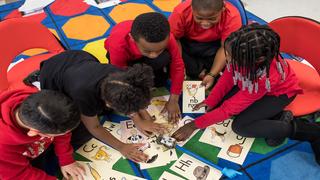Saint Joseph’s New Program is Preparing the Next Wave of Educators
The newly minted Magis Education Scholars Program is redoubling efforts to make sure future educators are more prepared than ever before to meet the unique challenges waiting for them in the classroom.

“I want to become a teacher as soon as I possibly can,” says Maisey Hartman ’27.
That sentiment is a popular refrain among the 21 first-year students currently participating in Saint Joseph’s new Magis Education Scholars program within the School of Education and Human Development. This program was made available to incoming first-year education majors who are looking to challenge themselves.
“[This program] is really about fostering aspiring educators to do more with their minds and their hearts by aligning academic learning opportunities with opportunities for community engagement and social justice,” says Aimee Terosky, EdD, Associate Dean of SEHD and Magis Scholars program director. “The way I sum it up is that this is for education majors who want more in terms of applying theories to real-world challenges.”
Terosky has certainly been able to deliver on her vision of a truly unique educational experience that prepares the next generation of educators for success. Students accepted to the Magis Scholars program have been invited to participate in Saint Joseph’s Philadelphia Summer Immersion Program, they are enrolled in a first-year service learning class taking place in Samuel Gompers K-8 School in the School District of Philadelphia and they have opportunities to hold positions on the Magis Scholars’ executive board.
An integral part of that preparation, Terosky says, is to expose students early and often to the realities of being a teacher. What better way to do that than to teach about education theory inside of a K-8 school.
“The students are embedded right in a school site,” Terosky says of teaching her Education 150 class in the library of Gompers. “When we're talking about theory in class, we can just walk down the hall and observe a topic in real life.”
This approach has been coupled with guest speakers who give students mechanisms for coping with potential burnout — a necessity in a drastically understaffed field experiencing a myriad of challenges.
“We've already been talking about burnout and how to take care of ourselves,” says Mackenzie Beals ’27. “I think it's great that [Dr. Terosky] is taking the initiative to help us integrate it into our lifestyle now. So when we become teachers, maybe we won't burn out so easily.”
Terosyk says she — and the speakers who visit — stress the importance of finding the balance between what she refers to as the “joy-to-slog ratio.”
“There's going to be slog. There are going to be things that are hard or you don't love doing, but the joy has to be there,” Terosky explains. “No matter what the resources are, no matter what the challenges are, how do we see schools as places of joy?”
It is a poignant question, one that lacks a single answer. But there is a specific trait that goes a long way toward both solving the conundrum of joy versus slog and stemming the flow of teachers currently streaming out of the classroom: a passion for helping students. In the Magis Education Scholars Program, this trait can be found in spades.
Teaching is caring for the whole student, not just the idea of the student, not just how you want the student to be. It's looking at them and knowing what they can be. How can you help them with what they're going through?
Michael McNicholas ’27
A Magis Education Scholar on the importance of teaching.“[Teaching] is for the greater good,” says Michael McNicholas ’27 of his desire to become a teacher. McNicholas was heavily influenced by teachers in his own life who helped him through the trials and triumphs of adolescence. “Teaching is caring for the whole student, not just the idea of the student, not just how you want the student to be,” he continues. “It's looking at them and knowing what they can be. How can you help them with what they're going through?”
Michael’s peers in the Magis Education Scholars program share his dedication and passion. Not even the turmoil swirling around education in the wake of the COVID-19 pandemic could dampen their resolve. If anything, it has only made these students more determined to get into the classroom.
“I feel like the state of [education] has made me want to be a teacher more,” says Sara Stoud ’27, president of the Magis Education Scholars program executive board. “I want to make sure that children are still getting the experience that I had. Everyone should be getting the same opportunity for education.”
Teachers, students and schools are all faced with new and unique challenges, which require new and unique solutions. Though the Magis Scholars program is in its infancy — having just been launched this August — it is safe to say that the future is in good hands and Saint Joseph’s is leading the way.
As McNicholas says, “you don't learn how to be a teacher from a textbook. You learn how to be a teacher from experience, and St. Joe's and the Magis Scholars program give you the opportunity to do that.”
